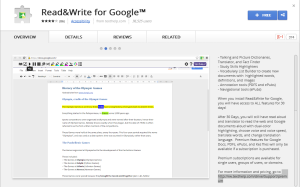ELA: The Core Six
Thanks to Ponderosa Elementary fourth grade teacher Becky Rice for the heads-up about this free download!
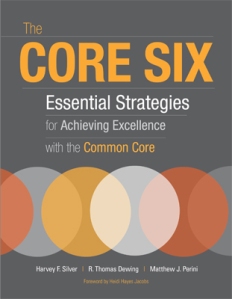 From the ASCD Website:
From the ASCD Website:
Odds are, your state has adopted the Common Core State Standards. You know how the standards emerged, what they cover, and how they are organized. But how do you translate the new standards into practice?
Enter the Core Six: six research-based, classroom-proven strategies that will help you and your students respond to the demands of the Common Core. Thanks to more than 40 years of research and hands-on classroom testing, the authors know the best strategies to increase student engagement and achievement and prepare students for college and career. Best of all, these strategies can be used across all grade levels and subject areas.
The Core Six strategies include Reading for Meaning, Compare & Contrast, Inductive Learning, Circle of Knowledge, Write to Learn, and Vocabulary’s CODE. What I especially like about this book is that for each strategy the authors explain how the strategy supports the Common Core State Standards, the research behind each strategy, and gives many sample lessons and checklists for implementing the strategy in the classroom.
This book has been on my wishlist for some time and I was super excited to learn it’s available for free download from the ASCD website. Download to your computer or tablet today! If you would prefer a traditional copy of the book it is available for around $12 from Amazon.
Interested in a book study? In person or on Edmodo? Email me at jolsen@sd273.com!

Ed Tech: Read and Write for Google
Jessica Lamb, a second grade teacher and DRT at Mullan Trail Elementary, uses the read aloud Chrome extension, Read&Write for Google™, with her second grade students. With its many features, this Chrome extension might be right for you.
Read&Write for Google™ works on PCs, Macs, and Chromebooks to add many powerful support features to the web and common file types in Google Drive. The free version offers features such as read aloud and translation to read the web and Google documents.
Unsure about using/installing Google apps, extensions, and scripts, contact me at kwest@sd273.com.

Ed Tech: Literacy Leveler App – Free Today on iTunes
Literacy Leveler, an app for iPad and iPhone, allows users to quickly scan books to easily determine Lexile and DRA reading levels. It is currently free in the iTunes Store. Be sure to download now before the price jumps back to $4.99!
The app is also available for Android devices on Google Play for $.99. 
ELA: Using Google Docs and Informational Text
Check out this short “How-To” video from teacher and educational blogger Richard Byrne. He demonstrates how he takes informational text, copies it into Google Docs, and then facilitates online collaboration with his students. Way cool!
Looking for a great source for Informational Text? Check out these four resources!
Elementary:
- Time for Kids
- Scholastic Listen & Read Archive (Leveled Articles by Lexile)
Secondary:
- New York Times: Room for Debate
- Newsela (Leveled Articles by Lexile)

ELA: More Idaho Core Workshop Resources
 Last Thursday Post Falls teachers met at Seltice Elementary to share ideas for building students’ academic vocabularies in order to support more complex and rigorous reading tasks. Teachers worked to understand the difference between Tier 1, Tier 2, and Tier 3 vocabulary words. This was the fourth part of a six part ELA series focused on the Idaho Core Standards. Join us March 6 as we explore Text-Dependent Questioning and March 20 for Argumentative Writing.
Last Thursday Post Falls teachers met at Seltice Elementary to share ideas for building students’ academic vocabularies in order to support more complex and rigorous reading tasks. Teachers worked to understand the difference between Tier 1, Tier 2, and Tier 3 vocabulary words. This was the fourth part of a six part ELA series focused on the Idaho Core Standards. Join us March 6 as we explore Text-Dependent Questioning and March 20 for Argumentative Writing.
Ponderosa Elementary teacher Kelly Howard created the Haiku Deck presentation above as part of a lesson for her third grade students.
Using Academic Vocabulary
- ELA Standards Related to Vocabulary K-5
- Marzano’s Six Step Process for Teaching Academic Vocabulary
- CCSS Text Exemplars & Planning for Academic Vocabulary Worksheet
- Edutopia: 11 Tips for Teaching Common Core Critical Vocabulary
- Edutopia: 8 Strategies for Teaching Academic Language
- Curriculum & Technology: Tier 2 Vocabulary Lists and Support
- Curriculum & Technology: Academic Vocabulary Digital Helpers
- Frayer Model Graphic Organizers
- Haiku Deck
Looking for resources from the previous three ELA workshop sessions? Visit this archived post. ELA: Idaho Core Workshop Resources.
Ed Tech: Doodle 4 Google
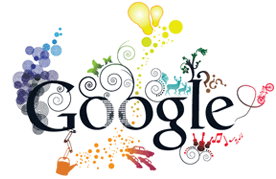 Google is hosting a National contest for students in grades K-12. Students who submit an original “Google Doodle” by March 20 have the opportunity to be one of 250 State Finalists chosen to compete for a National prize. The final winner will be given a $30,000 scholarship and $50,000 technology money for their school. Guest judges include Magic Treehouse author Mary Pope Osborne and Lemony Snicket.
Google is hosting a National contest for students in grades K-12. Students who submit an original “Google Doodle” by March 20 have the opportunity to be one of 250 State Finalists chosen to compete for a National prize. The final winner will be given a $30,000 scholarship and $50,000 technology money for their school. Guest judges include Magic Treehouse author Mary Pope Osborne and Lemony Snicket.
To get started visited Doodle 4 Google!
ELA: Constructed Response Alphabet Soup
With an increased focus on constructing high-quality responses to text-dependent questions, the Internet is abuzz with acronyms to help students tackle the Idaho Core Standards, but what do they all mean?
 R. A.C.E. – Restate, Answer, Cite, Explain.
R. A.C.E. – Restate, Answer, Cite, Explain.
By far, this is my prefered writing framework for helping students master the Idaho Core Standards. I’ve made a student-ready Prezi, Haiku Deck and handouts for teachers that can be downloaded and used with both elementary and secondary students.
O.R.E.O. – Opinion, Reason, Example, Opinion.
If you’ve been on Pinterest, you’ve probably seen this one! Teachers at Mullan Trail Elementary have been working with this framework and I’ve tried it a few times for short paragraphs at the elementary level. This Prezi by Heather Ramsey does an excellent job of presenting the basic idea behind O.R.E.O. (And it never hurts to have a box or two around to motivate writers!)
S.P.A.M. – Situation, Purpose, Audience, Mode.
This one is fairly new to me, but provides a framework for helping students analyze a writing prompt to determine the best response. S.P.A.M. is designed to help students understand the situation presented , why they are writing, and who they are writing for. I like this framework as it also encourages students to attend to very precise directions about how they are to respond. (ie. letter, email, article, essay.) For more information check out this blog post by The Brown-Bag Teacher.
R.A.F.T. – Role, Audience, Format, Topic.
R.A.F.T. is a strategy that has been around for sometime and is best suited for persuasive writing rather than argumentative writing as it is intended to help writers see situations from different viewpoints. Reading Rockets has a wealth of lessons and resources for using R.A.F.T. with students. For secondary teachers, readwritethink, has writing templates, sample lessons, and suggestions for teaching R.A.F.T. in the classroom.
Bottom line? Students are most successful when they have a strategy to fall back on. Pick one framework to teach explicitly and then continue practicing every time students write. By this time next year, students will be much more confident in their ability to construct responses to written questions and prompts.
Do you use a different writing framework? Let me know about it!

ELA: Welcome to Seussville Family Night
Have plans this Thursday? How about heading out for a Seusstastic night of fun?
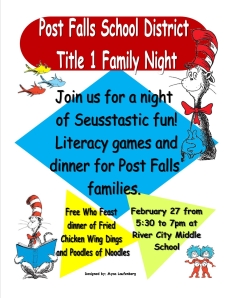 Title I Reading Specialists from Fredrick Post Kindergarten and all five elementary schools have collaborated to host the first ever district-wide family literacy night for Title I students and their families this Thursday night. The event will take place at River City Middle School from 5:30-7:00 and is free for all Post Falls families. If you’d like to volunteer for the evening event, please email me!
Title I Reading Specialists from Fredrick Post Kindergarten and all five elementary schools have collaborated to host the first ever district-wide family literacy night for Title I students and their families this Thursday night. The event will take place at River City Middle School from 5:30-7:00 and is free for all Post Falls families. If you’d like to volunteer for the evening event, please email me!
Families will be treated to a free “Who Feast” dinner of Chicken Wing Dings and Poodles of Noodles served by our elementary principals. Students and their families will also be able to visit seven different literacy centers with fun games and activities. Before leaving students will receive free books and be eligible to win Dr. Suess door prizes.
Thanks to the Jr. National Honor Society, Post Falls Library, Trojan Publishing, PFSD Food Services, and River City Middle School for their support of this event!
Looking for more Seusstastic resources? Check out these recommended Dr. Seuss resources from the International Reading Association’s readwritethink. website!
ELA: Informational Text Resources from TextProject
TextProject is a non-profit out of California that provides free resources for at-risk and beginning readers. The site currently has three separate informational text resources available for free download. Start downloading today!
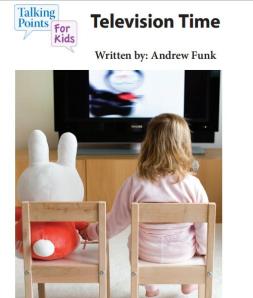 My favorite TextProject resource is Talking Points for Kids which is developed for struggling readers in grades 4-6. Each informational reader focuses on a debatable current topic and includes differing points of view. The end of each reader includes writing prompts and a graphic organizer for students. Teachers could easily turn these prompts into argumentative writing performance tasks similar to those presented on the Smarter Balanced Assessment. These readers are similar to the Paired Text and Debate articles in Scholastic’s Scope and Storyworks Magazines. Try one of the readers below or visit the Talking Points for Kids website for more topics!
My favorite TextProject resource is Talking Points for Kids which is developed for struggling readers in grades 4-6. Each informational reader focuses on a debatable current topic and includes differing points of view. The end of each reader includes writing prompts and a graphic organizer for students. Teachers could easily turn these prompts into argumentative writing performance tasks similar to those presented on the Smarter Balanced Assessment. These readers are similar to the Paired Text and Debate articles in Scholastic’s Scope and Storyworks Magazines. Try one of the readers below or visit the Talking Points for Kids website for more topics!
- Talking Points: School Time
- Talking Points: Exercise in School
- Talking Points: Television Time
Summer Reads is another Text Project resource that includes engaging informational readers for students in grades 3-5. Each level contains seven short chapter books. Teachers and students can access audio clips and comprehension questions related to each book from the TextProject website as well. Although produced to engage students during the summer months, these books could easily be sent home during the school year or over spring break.
Beginning Reads is a collection of beginning readers designed to connect students’ oral language to written text. There are currently ten levels of Beginning Reads books on the TextProject website. Each level focuses on a related concept and topic and become progressively more difficult. The free books include simple pictures and connected vocabulary for emergent readers. The Beginning Reads books can be downloaded from TextProject or free from iTunes.
Know any other good resources for informational text or argumentative writing? Let me know! 
Math: Zero the Hero visits FPK
Students at Frederick Post Kindergarten celebrated the 100th day of school yesterday with a very special guest! Zero the Hero spent the day in kindergarten classrooms teaching students about zero and sharing his own math superpowers. How did your class celebrate the 100th day of school?
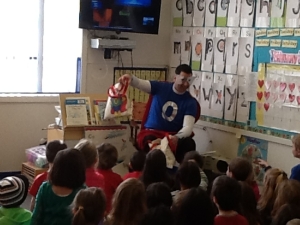
Want to integrate reading and math? Check out this Zero the Hero ebook from Reading is Fundamental!

